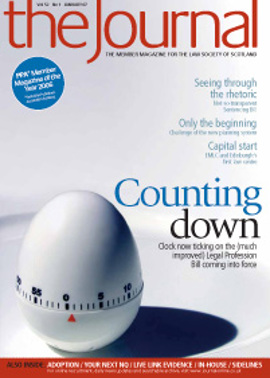On the radar

“Political” ad ban upheld
The 2003 Communications Act’s banning of political adverts does not violate rights to free speech, the High Court has ruled ([2006] EWHC 3059 (Admin)). An animal rights pressure group has lost its case, though it may appeal to the House of Lords.
Animal Defenders International (ADI) wants to advertise in broadcasts, despite the absolute prohibition in the Act on political advertising other than controlled party political broadcasts. It argued that the Act infringes its rights to free speech and therefore breaches the Human Rights Convention.
Charities are allowed to advertise if their ads are not “wholly or mainly political” in nature, according to the Broadcast Advertising Clearance Centre, which vets adverts for political content. It ruled that the ADI campaign “My mate’s a primate” broke the rules.
Political advertising was banned in order to prevent wealthy political interests from influencing the public more than groups with less money through TV advertising, which Parliament believed was a more powerful and influential medium than others, such as newspapers.
“The necessity for restrictions on political/social advocacy broadcast advertising outside elections periods has been convincingly shown”, Mr Justice Ouseley wrote (at 125) in rejecting ADI’s case. “It is necessary to protect the rights of others through preventing undue access to the broadcast media based on willingness and ability to pay. At root it supports the soundness of the framework for democratic public debate. The broadcast media remain pervasive and potent throughout the period between elections.”
Lord Justice Auld said that the case was made difficult by the lack of any precedent regarding what should be judged as “political” advertising. The court, he said, would have to rely on “its own resources”.
Auld said that the European Convention did not provide a blanket right to free speech in all situations. “Article 10 does not provide absolute protection for political speech. Nor does it entitle any person or body to a right of political expression over the air waves” (at 62).
“I have come to the view that Parliament in the context of the overall scheme of the 2003 Act..., acted within the ambit of the discretionary judgment available to it in introducing and maintaining the prohibition on political advertising, and that there is no basis for granting the declaration of incompatibility sought by ADI”, he ruled (at 81).
Tim Phillips, Campaigns Director of ADI, said: “There is a considerable inequity here, with government and big businesses able to use the broadcast media and their critics like ourselves excluded.”
He added: “We believe that time will show that in this case UK law is simply out of step with modern media practice with hundreds of television channels, and also our rights under the European Convention on Human Rights.”
Court backs NHS data release
The Court of Session has backed the Scottish Information Commissioner in its first ruling on the Freedom of Information (Scotland) Act. The decision ([2006] CSIH 58) confirms that the Commissioner was correct to order the release of information from the NHS’s Common Services Agency (CSA).
Michael Collie made a request on behalf of Chris Ballance MSP for information about the number of cases of child leukaemia in Dumfries and Galloway, broken down by census ward. The CSA refused on the basis that the numbers involved were so small that providing it would risk indirect identification of individuals.
Collie referred the case to the Commissioner, Kevin Dunion, who ruled that the information could be released as it was not personal data under the Data Protection Act.
The CSA uses a method called “barnardisation”, which is designed to allow the release of data in a way that does not identify individuals. This is a system of modification which randomly adds zero, plus one or minus one to the numbers two, three and four, and zero or one to the number one when they appear in a database. Named after George Barnard, Professor of Statistics at Essex University, Barnardisation is designed to disguise people’s identities when information consists of such low numbers.
The CSA appealed the Commissioner’s ruling to the Court of Session, where the Lord President presided. That court ruled that the Commissioner was correct.
“I have come to the view that a table setting out the census ward data for 1990-2001 for the Dumfries and Galloway postal area, barnardised in the manner described, would not constitute personal data of any of the children resident in Dumfries and Galloway who had in a relevant year been diagnosed with leukaemia”, his Lordship said (at 23).
“Although the underlying information concerns important biographical events of the children involved, by the stage of the compilation of the barnardised table that information has become not only statistical but perturbed to minimise the risk of identification of any individual child. It is no longer, in respect of any child, ‘biographical in a significant sense’,” he continued. “The rights to privacy of the individual children are not infringed by the disclosure of the barnardised data.”
The case involved the seemingly competing demands of freedom of information legislation and data protection laws. It is thought that a major proportion of cases going to the Scottish Information Commissioner relate to the interaction between the two codes.
“I am pleased at this landmark decision,” said Dunion. “The court has confirmed that authorities should not take a narrow view of what information should be provided and has concluded that I have a wide discretion to specify the form in which information should be released.”
“In this case I accepted that raw data should not be released, but I concluded that the authority could and should provide information in a modified form. This would at least give some indication of the incidence of childhood leukaemia without any risk to patient confidentiality.”
Free samples, dearer CDs, proposes Gowers
Music will be sampled free of charge and CDs will rise in price to compensate for music that is copied to iPods under a new intellectual property regime proposed by Andrew Gowers in December. But most of the UK’s laws are adequate, he concludes.
The former Financial Times editor was commissioned by Chancellor Gordon Brown in December 2005 to undertake an independent review of intellectual property.
Press coverage focused on Gowers’ wish for a private copying exception written into copyright law. Less well publicised was that Gowers sees no need for an accompanying copyright levy. In France, Germany and many other countries, private copying is allowed but compensated by a tax on blank media. The Copyright Directive says member states can choose to forbid private copying or allow it – provided there is fair compensation for right holders. Gowers believes that fair compensation can be found another way.
His report explains: “If rightholders know in advance of a sale of a particular work that limited copying of that work can take place, the economic cost of the right to copy can be included in the sale price. The ‘fair compensation’ required by the directive can be included in the normal sale price.” Thus CD prices would rise.
Gowers also revealed an ear for hip hop. The report notes that hip hop grew in the US in the late 1970s and early 1980s because producers could exploit a “transformative use” exception in US copyright law. That changed in 1991: a court ruling narrowed the exception significantly, so musicians had to “get a licence or do not sample”.
The Beastie Boys released the album “Paul’s Boutique” two years before that ruling. All the sampling on the album was uncleared. Gowers quotes the New York trio’s reply when asked about the changed regime: “we can’t go crazy and sample everything and anything like we did on ‘Paul’s Boutique’. It’s limiting in the sense that if we’re going to grab a two-bar section of something now, we’re going to have to think about how much we really need it.”
Gowers wants the EU’s Copyright Directive amended to allow for an exception for creative, transformative or derivative works, provided this does not conflict with the normal exploitation of the original work and does not unreasonably prejudice the legitimate interes of the rights holder.
WATCHDOG RAPS TALKSPORT’S BLOGGING
Radio station TalkSPORT has been censured by the UK’s advertising watchdog for placing advertising on football blogs that pretended to be normal blog postings, an activity known as comment spam.
The Advertising Standards Authority (ASA) found that a member of talkSPORT staff had sent a post on to a number of football related message boards that purported to be a normal communication from a fan.
“Fellas,” read the posting. “Have you heard what talksport radio are doing this season. They are recruiting a fan from every club in the premiership and football league, 92 fans in total who will become the voice for their club on their station.”
“Those selected will get a free copy of FIFA 07 from EA Sports on whatever platform you wish. At the end of the day it basically gives you the chance to be on air regularly throughout the entire football season and it might even get you on the first step to a new career. I just hope we get someone who knows what he is talking about.”
The tactic, which is akin to spamming, runs the risk of breaking the CAP Code, the rulebook followed by the ASA. It states that adverts must clearly be labelled as such.
TalkSPORT said that a member of its staff had made the posting, but that it was not the policy of the station to act in this way and that the member of staff had acted independently. The complaint against the station was upheld.
“The ASA noted talkSPORT radio had not intended the weblog postings to be part of their advertising campaign but the ads had, nonetheless, been placed by a member of their staff,” said the ASA ruling. “We acknowledged the measures taken to avoid mistakes of this sort happening in the future, but concluded that, because the ads had not been clearly identified as such, talkSPORT radio had breached the Code. The ads breached CAP Code clauses 7.1 (Misleading) and 22.1 (Recognising marketing communications and identifying marketers).”
In this issue
- The Isle of Man
- Contractual handcuffs: enhanced redundancy rights
- Strength of purpose
- Cleared for take-off
- Countdown phase
- A quiet revolution
- Acting your age
- Adopting new solutions
- Clear as mud?
- Majoring in minorities
- Believe in the future
- Appreciation: Dr J Stuart Fair
- Grow your own assistant
- On the radar
- Status of the expert's report
- Rewarding experience
- Restructuring - in hindsight
- Court rules catch up with live link TV
- Scottish Solicitors' Discipline Tribunal
- Website reviews
- Book reviews
- Top notch training
- A clearer way to deal
- Not the best option
- Letting in the disabled
- Single survey: have your say






